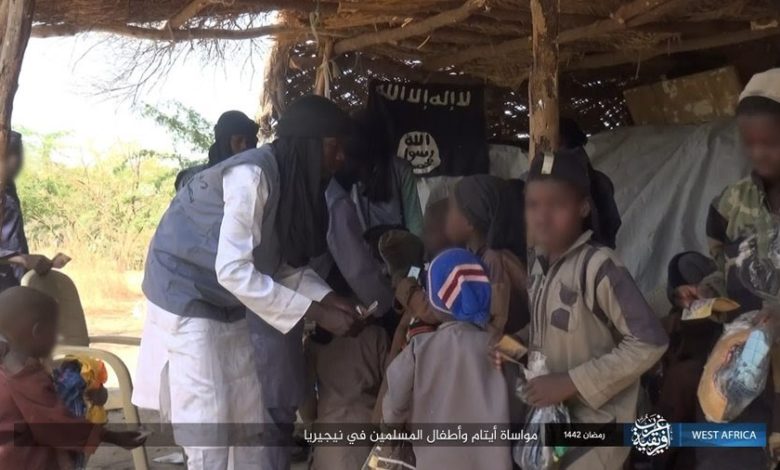New Info On Zakat Collection, Distribution Throws Light On ISWAP’s Revenue Model
The terror group revealed in a newsletter that it raised N51.9 million between March and May, this year, out of which it distributed N3.4 million to the poor during the Muslim fasting month of Ramadan.

In one issue of its newsletter (al-Naba) released on Thursday, the Islamic State West African Province (ISWAP) has provided details on how it generates money in areas under its control using zakat (obligatory Islamic charity).
ISWAP, a terror group that broke away from Boko Haram in 2016 after consolidating forces with the Islamic State, has an active presence in several Lake Chad countries, including Cameroon, Chad, Niger, and Nigeria.
The newsletter, translated from Arabic by Aymenn Jawad Al-Tamimi, an independent analyst on extremist violence in the Middle-East, revealed that the group received N51.9 million (which it estimated was $156,985) in the lunar months of Sha’aban and Ramadan (March 14 to May 12).
Muslims with significant wealth are mandated to give zakat every year based on the value of their savings and goods. The alms gathered are then redistributed to people who are not as rich.
In Nigeria, every Muslim whose savings is up to N1.9 million is expected to give zakat, which is 2.5 per cent of however much they own.
By raising N51.9 million, it means the wealth of people, who paid zakat to ISWAP within the two-month period, must have been calculated to be over N2 billion. This may have been either because of the sheer population of these communities or because some of the residents have considerable wealth.
“If the imposition of zakat by the West Africa province was previously known only through internal documents and anecdotal reports, it is now being advertised in the group’s official media,” Al-Tamimi remarked.
The terror group had released pictures, earlier in May, of its members distributing foodstuff to residents in Northeast Nigeria. HumAngle also gathered that it shared N20,000 to households in Geidam, Yobe State, the previous month.
The latest information about zakat collected was sent to al-Naba by the Amir of Diwan al-Zakat (head of ISWAP’s zakat finance department).
When it was established, the department formed four contingents of zakat collectors who go after people with enough money, livestock, and harvests in different localities.
ISWAP claimed that most of the people who paid zakat did so with “open hearts” and some even bore the costs of transportation for the collectors.
“And, on the other hand, there are those who are sad about that and the zakat is only taken from them in spite of them,” it added.
The Amir of Diwan al-Zakat explained that the zakat is distributed through a “Commission of Masarif of Zakat,” which collates the names of people entitled to receiving help.
“And concerning the efforts of the Diwan al-Zakat in the month of Ramadan … what has been distributed on the deserving of zakat from the Muslims during the past month of Ramadan has amounted to N3.42 million (i.e. around $8,800) for the poor, and 825 packets of food, in addition to 353 bundles of clothes for the orphans and children of the Muslims,” the newsletter reported.
It quoted locals as saying they often did not pay zakat before ISWAP seized control of the places and that the money usually did not get to the poor.
“Also they expressed their contentment with the efforts of the men of the Diwan al-Zakat and they prayed to God Almighty for Him to grant them success and help in undertaking this trust,” it added.
ISWAP then revealed plans to establish more Masarif offices and expand the reach of the Diwan so that their services can be closer to the people.
The terror group has been noted to typically exploit gaps in governance by trying to provide essential services in the communities under its control. This makes it easier for it to recruit new fighters from these places.
Despite breaking away from the Abubakar Shekau-led Boko Haram faction in 2016, the population of its fighters had roughly doubled those of the latter according to estimates, the International Crisis Group, a non-profit think tank, observed in a 2019 report.
The Institute for Security Studies (ISS) has made similar observations as well.
“As part of this approach, the ideological aspect of the crisis must be dealt with. The ability of the group to recruit is one of the biggest reasons for its expansion, and so a deeper understanding of its recruitment patterns and operating mechanisms is crucial,” the institute’s senior researcher Remadji Hoinathy warned in May 2019.
Support Our Journalism
There are millions of ordinary people affected by conflict in Africa whose stories are missing in the mainstream media. HumAngle is determined to tell those challenging and under-reported stories, hoping that the people impacted by these conflicts will find the safety and security they deserve.
To ensure that we continue to provide public service coverage, we have a small favour to ask you. We want you to be part of our journalistic endeavour by contributing a token to us.
Your donation will further promote a robust, free, and independent media.
Donate HereStay Closer To The Stories That Matter




